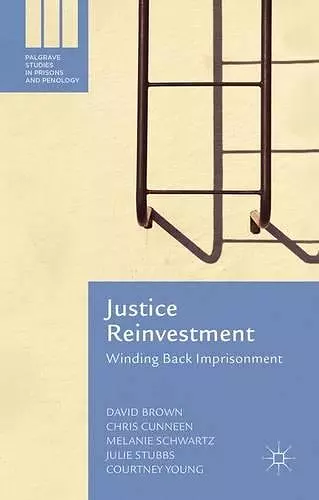Justice Reinvestment
Winding Back Imprisonment
David Brown author Chris Cunneen author Melanie Schwartz author Julie Stubbs author Courtney Young author
Format:Hardback
Publisher:Palgrave Macmillan
Published:29th Oct '15
Currently unavailable, and unfortunately no date known when it will be back

"The book brings together in one place the most detailed and insightful assessment of justice reinvestment that I have read. Its observations about the origination of the idea, its spread in the United States ('US') and elsewhere, and the challenges it now poses for penal reformers in my home country, the US, especially are, in my view, spot on. Congratulations to the authors; congratulations and thanks." (Todd Clear, former Provost at Rutgers University-Newark, and former Dean of the School of Criminal Justice)
While supporting a social justice approach, the book confronts significantly the problematic features of the politics of locality and community, the process of criminal justice policy transfer, and rationalist conceptions of policy.Justice reinvestment was introduced as a response to mass incarceration and racial disparity in the United States in 2003. This book examines justice reinvestment from its origins, its potential as a mechanism for winding back imprisonment rates, and its portability to Australia, the United Kingdom and beyond. The authors analyze the principles and processes of justice reinvestment, including the early neighborhood focus on 'million dollar blocks'. They further scrutinize the claims of evidence-based and data-driven policy, which have been used in the practical implementation strategies featured in bipartisan legislative criminal justice system reforms.
This book takes a comparative approach to justice reinvestment by examining the differences in political, legal and cultural contexts between the United States and Australia in particular. It argues for a community-driven approach, originating in vulnerable Indigenous communities with high imprisonment rates, as part of a more general movement for Indigenous democracy. While supporting a social justice approach, the book confronts significantly the problematic features of the politics of locality and community, the process of criminal justice policy transfer, and rationalist conceptions of policy. It will be essential reading for scholars, students and practitioners of criminal justice and criminal law.
“This book is … a major contribution to Australian public criminology, and the specific issue of the over-incarceration of Aboriginal people across Australia. … As Australia addresses both the overall increases in incarceration, and the specific hyperincarceration of Aboriginal people, this book provides essential reading … for academics, and government and non-government agencies hoping to make a difference.” (Bronwyn Naylor, Alternative Law Journal, Vol. 42 (1), 2017)
“The book brings together in one place the most detailed and insightful assessment of justice reinvestment that I have read. Its observations about the origination of the idea, its spread in the United States (‘US’) and elsewhere, and the challenges it now poses for penal reformers in my home country, the US, especially are, in my view, spot on. Congratulations to the authors; congratulations and thanks.” (Todd Clear, Current Issues in Criminal Justice, Vol. 28 (1), 2016)“The authors are to be congratulated for Justice Reinvestment: Winding Back Imprisonment, a book that is well researched and engaging, which stimulates thinking and provokes questions, and is an outstanding work of scholarship.” (Luke McNamara, Current Issues In Criminal Justice, Vol. 28 (1), 2016)
ISBN: 9781137449108
Dimensions: unknown
Weight: 4827g
291 pages
1st ed. 2016